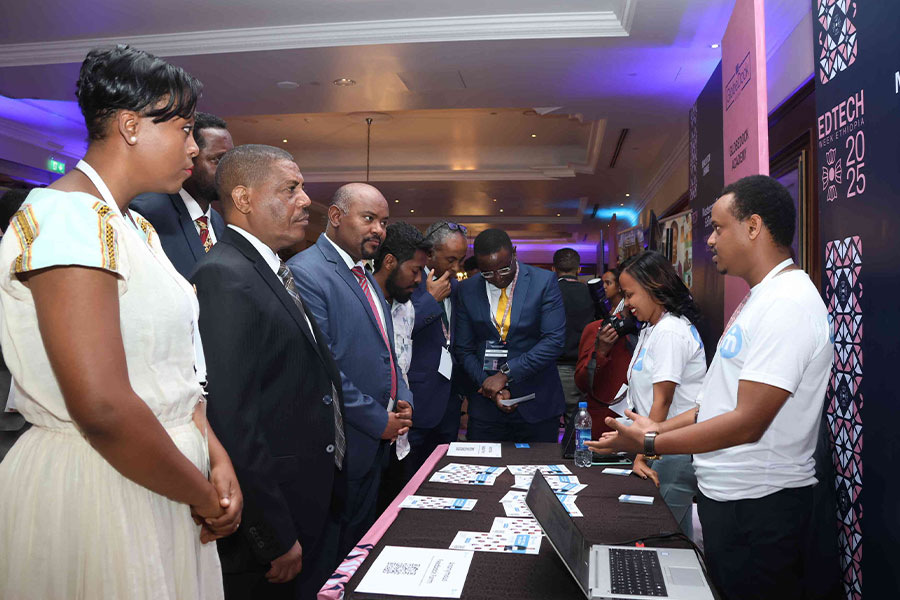
In-Picture | Jun 15,2025
Nov 20 , 2021
By Xavier Vives
Blah, blah, blah. That was how the young climate activist Greta Thunberg characterised this year’s climate summit in Glasgow (COP26) – even before it began. She was right, in a way. Talk is cheap whenever international agreements lack effective mechanisms to verify and enforce commitments. Gatherings like COP26 tend to lack credibility, even when they are presented as a “last chance” to prevent the end of the world as we know it. Nonetheless, such meetings help to raise awareness about the problem and potential solutions, and that is better than the denialism of past years.
True, the final agreement produced at COP26 appears weak, considering that the goal of keeping global warming below 1.5 degrees celsius is now barely alive. Instead of “unabated coal power” being phased out, now it will be “phased down,” a crucial change inserted at India’s insistence (and with China’s acquiescence). While “inefficient fossil-fuel subsidies” will still be “phased out,” the implication is that “efficient” fossil-fuel subsidies remain an option.
But, remember, talk is cheap. Given India’s high dependence on coal, it is perhaps better that it has set its net-zero emissions target for 2070 rather than proclaiming a “mid-century” commitment that it has no intention of upholding.
More broadly, there are two main obstacles to attaining the world’s stated climate goals. The first is geopolitical, exemplified by Russia’s use of natural gas as a strategic tool to divide Europe between those using nuclear power as an energy-transition technology (France) and those using gas (Germany). Even more important are major rivalries like the one between the United States and China. Here, there is some good news: COP26 seems to have induced the world’s two leading polluters to declare that they will work together to combat climate change. (We will know if this is more “blah, blah, blah” if and when bilateral military tensions increase.)
The second big obstacle is disagreement over how to compensate less-developed countries for forgoing or abandoning carbon-intensive technologies. The question is not only who foots the bill but also how financing should be delivered. The history of development aid is not particularly encouraging. And although it is well established that a global price for carbon is necessary to deal with the negative externality that greenhouse-gas emissions represent, implementing such a regime is difficult. Carbon markets remain mostly underdeveloped.
The deal adopted by almost 200 countries at COP26 will allow countries to meet their climate targets by buying offset credits representing emissions cuts made by others. This system will bring more clarity, but it is open to manipulation. Worse, it permits countries to carry forward carbon credits registered since 2013 and created under the Kyoto Protocol, potentially setting the stage for a flooding of the emissions market and an artificially low carbon price.
The COP26 agreement also encourages the public and private sectors to mobilise more climate finance, and to foster innovation in green technologies. To that end, one promising model is Operation Warp Speed, the US public-private partnership that made possible the extremely rapid development of COVID-19 vaccines.
The financial sector’s role in transferring resources from brown to green technologies will be crucial. Asset managers and financial intermediaries may act out of pure self-interest in divesting from dirty assets that they have come to see as too risky (owing either to the effects of climate change or to the transition that will render them obsolete). Alternatively, they may divest at the behest of others who have a green preference or a longer horizon over which to internalize climate problems. Universal owners such as large pension funds, for example, are increasingly aware of the systemic risks posed by climate change.
In any case, the financial sector is now coordinating to align itself more closely with the global climate agenda, as demonstrated by new initiatives such as the Glasgow Financial Alliance for Net Zero, chaired by former Bank of England Governor Mark Carney. It has become increasingly clear that the voluntary sustainable-finance mandates backed by financial intermediaries need to be significantly more stringent than they are today.
Green shareholder activism may force more disclosure of exposure to climate risk or even outright divestment, but mandatory disclosure under a clear framework will probably be needed to police greenwashing. The new International Sustainability Standards Board is a welcome development in this direction.
Finally, financial regulation and central bank policies also have key roles to play in promoting a green economy. Central banks, particularly after the 2007-09 financial crisis, have a mandate to ensure financial stability, and with climate change posing a systemic risk, they will have to incorporate it in their prudential frameworks. They also will need to foster a more transparent disclosure environment, so that climate risk is properly priced (although this is easier said than done). Many central banks already are engaging in climate stress tests and designing forward-looking transition scenarios.
More controversial are the questions of whether, and to what extent, central banks should favour green assets (or penalise brown ones) in their asset-purchase programs, and to what extent capital requirements should be attuned to sustainability criteria. Should brown loans have a capital surcharge over and above risk considerations (or should green loans carry a discount)? Such provisions would make no sense in a world where carbon is priced properly, but we are a long way from that scenario.
The international community’s climate goals remain highly ambitious, especially for a world characterized by great-power rivalries. It is rare for parties with disparate interests to work together as a team. Compromise is necessary, and “cheap talk” is the first step toward agreeing on a common course of action.
PUBLISHED ON
Nov 20,2021 [ VOL
22 , NO
1125]


In-Picture | Jun 15,2025

Viewpoints | Mar 09,2019

Radar | Jan 18,2020

Sunday with Eden | Mar 05,2022

Life Matters | Dec 25,2021

Sunday with Eden | Oct 08,2022

Commentaries | Mar 09,2019

My Opinion | Jun 28,2025

Commentaries | Nov 06,2021

Sunday with Eden | Apr 01,2023

My Opinion | 131970 Views | Aug 14,2021

My Opinion | 128359 Views | Aug 21,2021

My Opinion | 126296 Views | Sep 10,2021

My Opinion | 123912 Views | Aug 07,2021

Dec 22 , 2024 . By TIZITA SHEWAFERAW
Charged with transforming colossal state-owned enterprises into modern and competitiv...

Aug 18 , 2024 . By AKSAH ITALO
Although predictable Yonas Zerihun's job in the ride-hailing service is not immune to...

Jul 28 , 2024 . By TIZITA SHEWAFERAW
Unhabitual, perhaps too many, Samuel Gebreyohannes, 38, used to occasionally enjoy a couple of beers at breakfast. However, he recently swit...

Jul 13 , 2024 . By AKSAH ITALO
Investors who rely on tractors, trucks, and field vehicles for commuting, transporting commodities, and f...

Jul 5 , 2025
Six years ago, Ethiopia was the darling of international liberal commentators. A year...

Jun 28 , 2025
Meseret Damtie, the assertive auditor general, has never been shy about naming names...

Jun 21 , 2025
A well-worn adage says, “Budget is not destiny, but it is direction.” Examining t...

Jun 14 , 2025
Yet again, the Horn of Africa is bracing for trouble. A region already frayed by wars...

Jul 6 , 2025 . By BEZAWIT HULUAGER
The federal legislature gave Prime Minister Abiy Ahmed (PhD) what he wanted: a 1.9 tr...

Jul 6 , 2025 . By YITBAREK GETACHEW
In a city rising skyward at breakneck speed, a reckoning has arrived. Authorities in...

Jul 6 , 2025 . By NAHOM AYELE
A landmark directive from the Ministry of Finance signals a paradigm shift in the cou...

Jul 6 , 2025 . By NAHOM AYELE
Awash Bank has announced plans to establish a dedicated investment banking subsidiary...